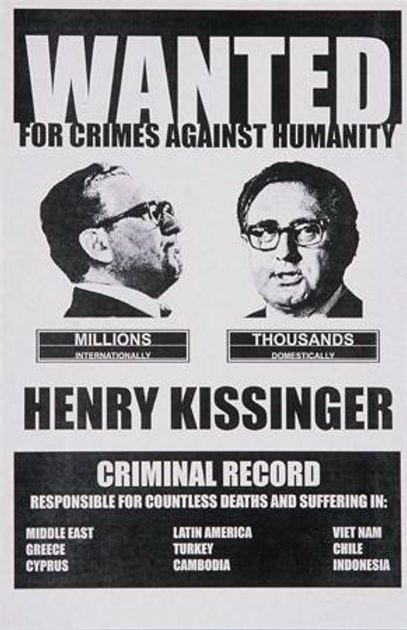Also, as a PSA, if Isaac Chotiner ever asks to interview you, probably say no. The cemetery is filled with his interviewees who euthanized their own credibility.
https://www.newyorker.com/news/q-and-a/can-liberalism-be-saved
In this case, our intrepid interviewee, legal scholar and law professor Cass Sunstein, whose entire book is a defense of liberalism (which he defines broadly in the classic sense and “includes New Deal liberals and so-called classical liberals, including Friedrich von Hayek and Robert Nozick, as well as politicians such as Ronald Reagan”) can’t bring himself to condemn dictatorships or war crimes. I suppose it’s not considered genteel in elite circles to call someone directly on their direct contribution to sabotaging peace talks, extending wars, provoking wars, or supporting death squads. But I guess we can always talk about Star Wars:
“This debate about what should actually be included when we think about human rights—that wasn’t what was going on with Reagan. The Reagan Administration would laud any dictator that it liked and garland them with praise.
I hear you. So here you have [a clash between] human-rights enthusiasts who are cautious about making what they see as undue compromises for the sake of alliances and others who think that you can make temporary compromises of liberal principles for the sake of obtaining alliances that might insure that people’s rights are protected in the long term. And I feel I kind of have a division of labor within my family on that one, and I defer to spouse.
Your spouse being Samantha Power.
I defer to that human-rights advocate, who is also a realist. [Power became famous in the nineteen-nineties for her journalistic work on issues of human rights, and was seen as an idealist. She later served in the Obama Administration as U.N. Ambassador, and in the Biden Administration as the head of U.S.A.I.D.]
You can defer to her. I was just asking because you put it in the first sentence.
All I meant by human rights was some category of fears that are walled off from government intrusion. If you say, I believe in freedom of speech, freedom of religion, private property, freedom from unreasonable searches and seizures, and I don’t believe in social security, I don’t believe in a right to a home, I don’t believe in a right to be free from discrimination, I don’t believe in a right to education, then you can still be a liberal.
In terms of human rights, I’ve always found it a little bit puzzling, given what you write, and given who your wife is, that you two were so close to Henry Kissinger. Of all the pre-Trump political figures in America, he is the one I think of as in some ways the opposite of liberal, given his behavior toward the rest of the world.
I’ll tell you a story. I wrote a book a few years ago on Star Wars. We invited Dr. Kissinger to my Star Wars book party, and he said, “You wrote a book about Star Wars? Why’d you write a book about Star Wars?” He was puzzled and courteous, but really confused. And then he came to the book party, which was quite generous. He was a busy person.
But, despite his busyness, he came to the book party.
Yeah, and then I gave a talk on Star Wars, and he came up to me afterward and he said, “Oh, I see why you wrote a book on Star Wars. There’s a lot there. It’s, like, about families and it’s about governments and freedom.” The amount of curiosity and generosity that he showed was incomparable. I don’t know anyone who showed that level of curiosity and generosity. And we really got into Star Wars. He just wanted to think about it. I know there are strong views about his career, and I’m hardly an expert on his career.
But your wife is one of the great human-rights experts in the world. I asked you about him being anti-liberal, and your response was that he was very nice to you about your book.
About Star Wars.
It is certainly a touching story. But that’s not totally an answer to the question.”
Tapdancing on the edge of the cliff.


